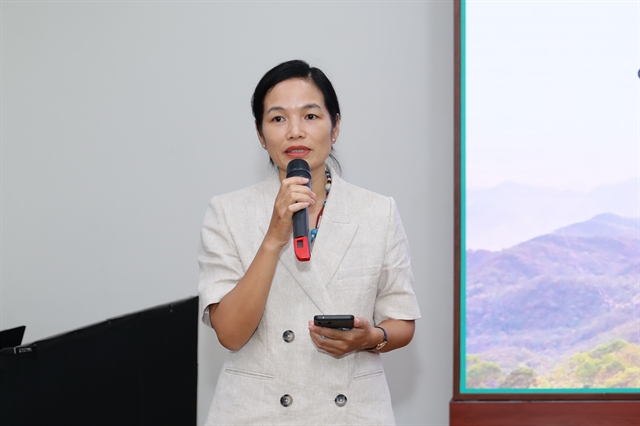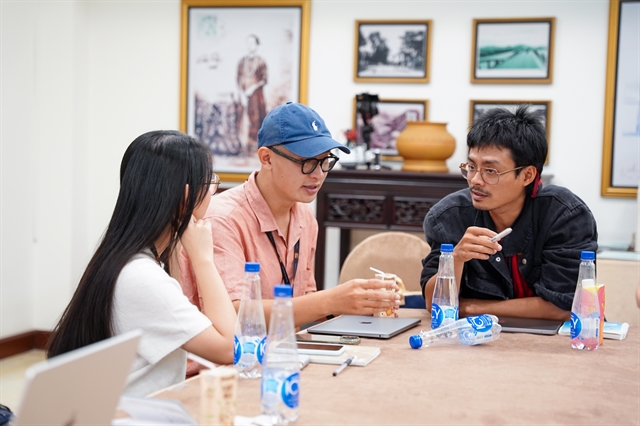Project Incubator is part of the third Đà Nẵng Asian Film Festival (DANAFF III), held in Đà Nẵng from June 29 to July 5.

EXPERT ADVICE: Film producer Trần Thị Bích Ngọc. Photo courtesy of DANAFF
More than a dozen outstanding film projects in the Asian-Pacific region have been selected to compete for the Best Project Award in a marketing programme titled 'Project Incubator', a highlight of DANAFF Talents. This key programme is part of the third Đà Nẵng Asian Film Festival (DANAFF III), held in Đà Nẵng from June 29 to July 5. Việt Nam News reporter Trần Khánh An interviewed producer Trần Thị Bích Ngọc, head of Project Incubator.
Since this is the first year DANAFF is organising a marketing programme, what goals does the festival hope to achieve through this new initiative?
As a producer, I’ve had opportunities to attend numerous project markets around the world, each of which has helped my projects grow and brought those films to reality. That experience has always fuelled a dream of mine: to one day see similar models established in Việt Nam.
The DANAFF organising committee has shown great dedication in its third edition by launching Project Incubator, a platform that goes beyond the traditional project market.
We will hold four days of masterclasses with international mentors to support the development of the selected projects. Following that, the filmmakers will present their pitches to distinguished international juries, who will select the most outstanding one. One highlight is the live networking session involving production, distribution and film funding partners, designed to help filmmakers find the right collaborators for their projects.
Through Project Incubator, I hope that young filmmakers are given a platform to showcase their projects – a space where their creative voices are recognised and valued and eventually, they have the chance to turn those ideas into real films.
Why is the programme divided into Arthouse Film Projects and Genre Film Projects for Vietnamese filmmakers? Are there any notable trends among the projects submitted this year?
Each genre has its own way of developing a project, so dividing them into separate categories makes it easier to offer the right kind of support. This helps ensure the projects and filmmakers get what they truly need.
Projects in the Arthouse Film category highlight distinctive voices, even intimate stories. In this year’s edition, many of the films delve into themes such as isolation and loneliness in today’s society. There is even a hybrid film project that blends elements of both documentary and fiction genres.
In the Genre Film Projects category for Vietnamese filmmakers, I found it exciting to see stories that deeply reflect Vietnamese cultural identity, particularly those drawing inspiration from mythology and traditional folktales. We also received quite a few projects in the thriller and horror genres, which have been growing trends in recent years. These projects offer fresh and contemporary voices that are easier for audiences to connect with.

NEW DIRECTION: Young filmmakers in the Arthouse Films category take part in discussions during the first masterclass session. Photo courtesy of DANAFF
What difficulties are Vietnamese filmmakers facing when trying to make their films come to life?
Young Vietnamese filmmakers today have more opportunities to bring their films to life compared to when we started. However, those opportunities also come with challenges. The competition is tough, and if your voice isn’t truly distinctive, your film can easily be forgotten.
As audience tastes become more refined and discerning, I hope we’ll see more support given to young filmmakers making arthouse films. Filmmaking isn’t something you can do on your own; it requires connection, a sense of community and support across generations.
For young filmmakers, being in the right professional environment with proper guidance early on can deeply shape their filmmaking mindset for the future. That’s why I truly hope that young Vietnamese filmmakers will have access to more professional spaces where they can grow, build a strong sense of professionalism and develop their distinctive voice – one that can carry Vietnamese stories to the world.
Việt Nam has had short film project markets before; for example, the CJ Short Film Project has been running for six seasons. So what sets Project Incubator apart from these previous initiatives?
In the journey of a professional filmmaker, short films play a very important role. They may not bring in money, but they act as a kind of calling card for directors to define their voice and show what they’re capable of. The CJ Short Film Project has done an excellent and meaningful job in discovering and supporting young filmmaking voices in this space.
However, feature filmmaking is a completely different game, more like a marathon, which means it requires a different kind of support. That’s where a project market like Project Incubator at DANAFF comes in. It serves as a continuation for the new generation, helping young filmmakers move forward beyond their short films. Because often, after finishing a short film, it can be extremely difficult to make that leap to a first feature, and even harder to complete a second one.
What we need is consistent, long-term support that helps them move smoothly from one stage of their career to the next. Only when there is a strong, connected ecosystem can we build a sustainable film industry. Cinema, after all, is not something that can thrive in isolation – it needs community, collaboration and continuity. VNS